This story from the Guardian sums up the historic decision on same-sex marriage issued by the US Supreme Court on June 26, 2015.
An excerpt from the 103 page opinion written for the majority (5-4) by Justice Anthony Kennedy:
The Constitution promises liberty to all within its reach, a liberty that includes certain specific rights that allow persons, within a lawful realm, to define and express their identity. The petitioners in these cases seek to find that liberty by marrying someone of the same sex and having their marriages deemed lawful on the same terms and conditions as marriages between persons of the opposite sex.
The momentous legal opinion paves the way for a little more equality. Thank you, Justice Kennedy — and now the work in welcoming the four arch-conservative justices into the non-constructionist, non-textualist 21st century must continue apace.
From the Guardian:
His prose may lack the fiery eloquence of his US supreme court colleagues Ruth Bader Ginsburg and Antonin Scalia, or the razor-sharp precision of chief justice John Roberts, but the majority opinion written by Justice Anthony Kennedy – granting a constitutional right to same-sex marriage across the United States – will go down as one of the most important legal documents in the history of the American civil rights struggle.
Court-watchers were left in little doubt where most of the nine justices stood on marriage equality after two and a half hours of extended oral arguments held the hushed halls of the nation’s highest tribunal spellbound in April.
On one side, the court’s traditional liberals: Ginsburg, Stephen Breyer, Sonia Sotomayor and Elena Kagan were withering in their view of the arguments advanced by Republican-controlled states that wanted to hold back the growing tide of legal rulings that backed gay marriage.
On the other side of the bench were the more reliably conservative members of the supreme court – Scalia, Samuel Alito and the typically silent Clarence Thomas – who believed not just that marriage should remain solely between a man and woman, but that the court had no right to voice its opinion on the matter at all.
More inscrutable, however, were Roberts, who barely said a word throughout the entire hearing, and Kennedy, who seemed genuinely unsure which way to lean: he expressed concern for the consequence of either ruling.
Kennedy, the 78-year-old former lawyer from California appointed to the bench by Republican president Ronald Reagan a generation ago, is seen – in theory – as one of the conservative majority. But in practice, he has long been the most enigmatic of the swing voters on some of the most defining stories in American history.
On Thursday, he had joined Roberts in defending Barack Obama’s healthcare reforms from yet another legal onslaught by conservative critics.
But on Friday, the day same-sex marriage became the law of the land, Roberts had decided to stay firmly in the conservative camp.
And so Kennedy became the one man to effectively determine a decision that will directly affect millions of Americans in love – and redefine a core legal and social bedrock for all of them, perhaps forever.
…
The closest Kennedy came to capturing the emotion felt by campaigners and protesters on both sides of the argument was when he was describing the institution at the heart of the argument.
“No union is more profound than marriage, for it embodies the highest ideals of love, fidelity, devotion, sacrifice and family,” he wrote. “In forming a marital union, two people become something greater than once they were.”
Those who know the court best are in little doubt as to the significance of Kennedy’s words.
…
But on a day when a funeral for victims of the Charleston church shootings cast a long shadow over the ongoing battle for racial equality, the decision was a source of hope for many.
“America should be very proud,” said Barack Obama in an emotional statement from the White House rose garden.
“There’s so much more work to be done to extend the full promise of America to every American,” he added. “But today, we can say in no uncertain terms that we’ve made our union a little more perfect.”
Read the entire article here.
Image: Anthony Kennedy, Associate Justice of the Supreme Court of the United States, 2011. Public Domain.


 Is your business jewish? Does your corporation follow the book of tao or the book of mormon or those of shadows (wicca) or yasna (zoroastrianism)? Or, is your company baptist, muslim, hindu or atheist or a practitioner in one of the remaining estimated 4,200 belief systems?
Is your business jewish? Does your corporation follow the book of tao or the book of mormon or those of shadows (wicca) or yasna (zoroastrianism)? Or, is your company baptist, muslim, hindu or atheist or a practitioner in one of the remaining estimated 4,200 belief systems? Paradoxically the law and common sense often seem to be at odds. Justice may still be blind, at least in most open democracies, but there seems to be no question as to the stupidity of much of our law.
Paradoxically the law and common sense often seem to be at odds. Justice may still be blind, at least in most open democracies, but there seems to be no question as to the stupidity of much of our law.